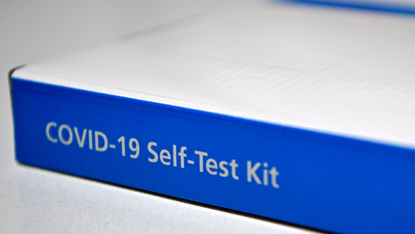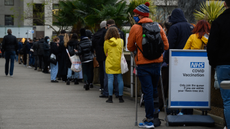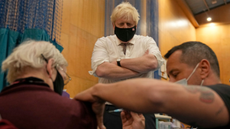Will we have to pay for lateral flow tests?
Insider says government cannot continue to hand out free tests to everyone for evermore

Free lateral flow tests (LFTs) for members of the public may soon become a thing of the past, with the rapid devices provided only in “high-risk settings” such as hospitals and schools, according to reports.
A senior Whitehall source told The Sunday Times that it is “likely we will move to a scenario where there is less testing” as part of the government’s plans for the UK to attempt to live with Covid. “I don’t think we are in a world where we can continue to hand out free lateral flow tests to everybody for evermore,” the unnamed source said.
Around £6bn has been agreed by the government in contracts for lateral flows, said the paper, although it added that “this is probably an underestimate”. According to the government, 1.7 billion tests have been distributed across the UK since the start of the pandemic. However, last June, the National Audit Office said the results of just 14% of the lateral flows sent out in England at the time had been registered with Test and Trace.
Subscribe to The Week
Escape your echo chamber. Get the facts behind the news, plus analysis from multiple perspectives.

Sign up for The Week's Free Newsletters
From our morning news briefing to a weekly Good News Newsletter, get the best of The Week delivered directly to your inbox.
From our morning news briefing to a weekly Good News Newsletter, get the best of The Week delivered directly to your inbox.
Nadhim Zahawi ‘plays down’ suggestion
Appearing on Sky’s Trevor Phillips on Sunday, Education Secretary Nadhim Zahawi “played down” the suggestion that the government was ending its provision of free lateral flow tests for members of the public, said The Guardian.
“He said the ultimate aim was to move to a position where Covid was endemic in the UK and the country had learned to live with the virus,” the paper added.
However, Housing Secretary Michael Gove did not directly answer Sky News’ Kay Burley when asked whether LFTs could be phased out in the coming weeks. The rapid tests will be free for “as long as we need them”, he said.
On Twitter, Scotland’s First Minister Nicola Sturgeon described the suggestion that Downing Street could end the scheme as “utterly wrongheaded”. “Hard to imagine much that would be less helpful to trying to ‘live with’ Covid,” she added.
Sign up for Today's Best Articles in your inbox
A free daily email with the biggest news stories of the day – and the best features from TheWeek.com
A government spokesperson told the Sunday Times that “everyone can continue to get free tests” and that “record numbers of tests are being delivered to pharmacies, homes and those who need them”.
“Testing continues to play an important role in helping people live their day-to-day lives, keep businesses running and keep young people in school,” they added.
Supply chain issues
Last July, reports suggested that rapid tests would no longer be available online for free past September. However, four months later, packs of seven LFTs are still available for members of the public to order per day from the government website.
But despite LFTs still being free to order online, supply chain issues have meant that it has been almost impossible to find a delivery slot in recent weeks.
The at-home Covid tests are designed to be used by people who do not have symptoms of the virus – so can play a key role in identifying infected people who would otherwise not have been tested.
Create an account with the same email registered to your subscription to unlock access.
Kate Samuelson is the newsletter editor, global. She is also a regular guest on award-winning podcast The Week Unwrapped, where she often brings stories with a women’s rights angle. Kate’s career as a journalist began on the MailOnline graduate training scheme, which involved stints as a reporter at the South West News Service’s office in Cambridge and the Liverpool Echo. She moved from MailOnline to Time magazine’s satellite office in London, where she covered current affairs and culture for both the print mag and website. Before joining The Week, Kate worked as the senior stories and content gathering specialist at the global women’s charity ActionAid UK, where she led the planning and delivery of all content gathering trips, from Bangladesh to Brazil. She is passionate about women’s rights and using her skills as a journalist to highlight underrepresented communities.
Alongside her staff roles, Kate has written for various magazines and newspapers including Stylist, Metro.co.uk, The Guardian and the i news site. She is also the founder and editor of Cheapskate London, an award-winning weekly newsletter that curates the best free events with the aim of making the capital more accessible.
-
 Shardlake: a 'tightly plotted, gorgeously atmospheric piece of television'
Shardlake: a 'tightly plotted, gorgeously atmospheric piece of television'The Week Recommends Arthur Hughes captivates in this 'eminently watchable' Tudor murder mystery
By Irenie Forshaw, The Week UK Published
-
 Major League Baseball is facing an epidemic of pitcher's injuries
Major League Baseball is facing an epidemic of pitcher's injuriesUnder the Radar Many insiders are blaming the pitch clock for the rise in injuries — but the league is not so sure
By Justin Klawans, The Week US Published
-
 8 movie musicals that prove the screen can share the stage
8 movie musicals that prove the screen can share the stageThe Week Recommends The singing and dancing, bigger than life itself
By Scott Hocker, The Week US Published
-
 The tricky science behind reviving ‘zombie viruses’
The tricky science behind reviving ‘zombie viruses’feature 48,500-year-old pathogen poses no risk to humans, but scientists hope to learn more about impact of melting permafrost
By The Week Staff Published
-
 The Week Unwrapped: Immunity, Tunisia and Big Brother
The Week Unwrapped: Immunity, Tunisia and Big Brotherpodcast Will a drug called Evusheld cut Covid deaths still further? Is the Arab Spring over? And are we ready for the return of reality TV?
By The Week Staff Published
-
 Is Hezbollah losing its grip in Lebanon?
Is Hezbollah losing its grip in Lebanon?feature Voters abandon Islamist group in first election since economic collapse
By The Week Staff Published
-
 ‘Chris Whitty should not be subject to ignorant public attacks by politicians’
‘Chris Whitty should not be subject to ignorant public attacks by politicians’Instant Opinion Your digest of analysis from the British and international press
By The best columns Published
-
 ‘The NHS will need huge amounts of understanding by patients’
‘The NHS will need huge amounts of understanding by patients’Instant Opinion Your digest of analysis from the British and international press
By The best columns Published
-
 ‘Protect the NHS is Boris Johnson’s war cry. But protect it from whom?’
‘Protect the NHS is Boris Johnson’s war cry. But protect it from whom?’Instant Opinion Your digest of analysis from the British and international press
By The best columns Published
-
 ‘Government should stick to its guns on Plan B’
‘Government should stick to its guns on Plan B’Instant Opinion Your digest of analysis from the British and international press
By The best columns Published
-
 ‘Many more people are realising how bad England’s Covid situation is’
‘Many more people are realising how bad England’s Covid situation is’Instant Opinion Your digest of analysis from the British and international press
By The best columns Published